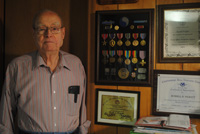Editorial
Front Page - Friday, December 3, 2010
World War II veteran recounts tireless dedication, service
Erica Tuggle
 Russell Pickett served with Company A of the 116th infantry during World War II. One of the battles he fought in was the Battle of Normandy, where 96 percent of the men in his company were casualties within the first 30 minutes of battle, (half of these were fatalities and half were wounded.) Pickett earned 13 medals for the duration of his service, but says that they don’t mean much to him because the real heroes are the ones who were unable to come home after the battle.
- Erica Tuggle
Russell Pickett served with Company A of the 116th infantry during World War II. One of the battles he fought in was the Battle of Normandy, where 96 percent of the men in his company were casualties within the first 30 minutes of battle, (half of these were fatalities and half were wounded.) Pickett earned 13 medals for the duration of his service, but says that they don’t mean much to him because the real heroes are the ones who were unable to come home after the battle.
- Erica Tuggle
Russell Pickett does not want to be called a hero. He also says the 13 medals he received from his time in the Army during World War II don’t mean that much to him because the real heroes are the ones buried where they died during battle.
Pickett started his service with the beginning invasion during the Battle of Normandy, and was the only Tennessean in the first wave assault. During the first 30 minutes of this battle, 96 percent of his company were casualties, and half of that were fatalities. The remaining percent were left to fight the horrible and tragic battle that ensued.
Pickett grew up in Soddy Daisy during the Great De-pression. His father died when Pickett was 11-years-old, so he quit school at 16 to help support his mother and five siblings. Before the war broke out, Pickett had never been more than 50 miles from home. He immediately wanted to go into the service at age 17, but his mother wouldn’t sign the papers for him to go. The news of England’s need, German actions and the bombing of Pearl Harbor had all the boys at home fired up to go, he says.
When Pickett was sent a questionnaire on his 18th birthday, he indicated he was unemployed (although working sun up to sun down for 50 cents every day) so that he was sworn into service speedily, a month after his birthday, and begun the events that he would later recount in his memoirs.
Pickett says he published the memoirs mainly because his grandchildren wouldn’t stop hounding him about it, and then his granddaughter took what he wrote and put it into book form. He purposely left out the more gory details so that these wouldn’t be left behind for the family, but these pages detail his true story that war movies simply can’t copy.
After Pickett’s training, he made the six-day journey overseas where he and 3,000 others were loaded onto “El de France,” a French ship sailing under British command. After more training on the beaches as a flamethrower for Company A of the 116th division, the date of the invasion drew near.
Before battle, his group was told that many would die and were given the opportunity to walk to the front, be put in another section of the army and not have to go into this battle. Pickett says that not a single man stepped forward. They were all trained, ready and even eager to go.
When they invaded, he was in a boat on the Western end approaching the beach. Less than 100 yards from the beach the boat exploded. Pickett woke up lying on the beach, unable to
walk, his equipment gone and a
dead solider, he imagined dragged
him to shore a few yards from him.
Picket says he lay there as the tide came in and washed him back out with other less fortunate soldiers. He used his combat knife to gather more life vests to him and waited for one of the boats to pick him up.
Through the grace of God, as the boat carried him back to England, he regained the use of his legs and wasn’t hurt anywhere. He opted to go back into fighting instead of the hospital and returned to the beaches seven days after D-Day. When he returned to his company, he only recognized three men he knew, and two of those died in the next battle.
Pickett was injured again in the Battle of St. Low when a hand grenade sent shrapnel into his arm and shoulder. He spent 21 days in England healing, returned to combat and was soon after hit again, knocked unconscious, and sent back to England, where he worke up and was put out of action for good. At this point, he had been on the front line around the clock for 62 days. Pickett says he didn’t want to come home yet and was put on limited duty in a hospital until the war was over.
Pickett received seven medals from the U.S. and six from France after his service, but is still working on behalf of his fellow soldiers. He has had to work over the years to obtain his 100 percent disability, and since then has helped other veterans get their much needed and deserved disability pay.
One year he helped 11 veterans get 100 percent disability, and during the next six months, he helped another 11 get their disability. He still offers a helping hand to those who need it.
Pickett may not like being called a hero for his actions, but maybe he won’t mind if we all give him our gratitude and sincere thanks for his service to our country and freedom.
|
|